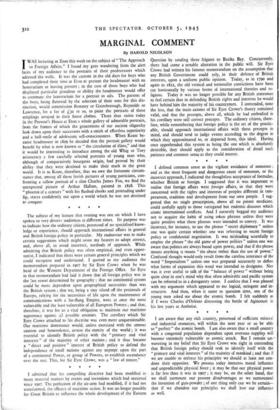I defined common sense as the vigilant avoidance of nonsense
; and as the most frequent and dangerous cause of nonsense, or the incorrect approach, I indicated the thoughtless acceptance of formulas, whether British or foreign. I suggested that it was important to realise that foreign affairs were foreign affairs, in that they were concerned with the rights and interests of peoples different in tem- perament, tradition and development from our own people. I sug- gested that no single prescription, above all no patent medicine, could usefully apply to those variegated but endemic diseases which create international conflicts. And I earnestly begged my audience not to acquire the habit of using token phrases unless they were quite positive what these phrases were intended to convey. It was incorrect, for instance, to use the phrase " secret diplomacy " unless one was quite certain whether one was referring to secret foreign policy or confidential negotiation. It was misleading scornfully to employ the phrase " the old game of power politics " unless one was aware that politics are always based upon power, and that if the phrase means anything it means " the abuse rather than the use of power." Confused thought would only result from the careless utterance of the word " Imperialism " unless one was prepared accurately to define what forms of expansion this word was intended to designate. Nor was it ever useful to talk of the " balance of power " without being quite clear in one's mind why that often admirable and pacific system can be referred to in a derogatory sense. I confess that I was pleased with my argument which appeared to me logical, stringent and in- structive. And then, when it came to question time, one of the young men asked me about the atomic bomb. I felt suddenly as if I were Charles d'Orleans discussing the battle of Agincourt in his last years at Amboise.


























 Previous page
Previous page